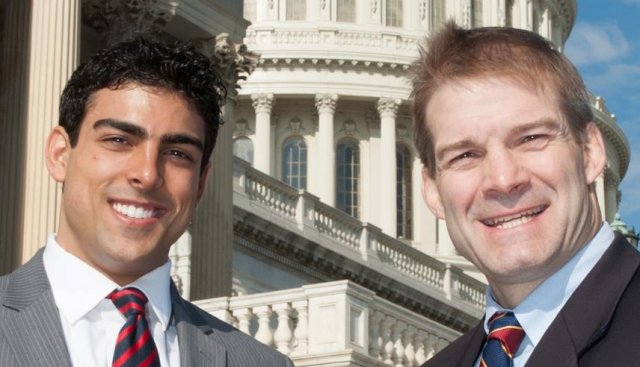
When the Republican Study Committee, an influential group of Republicans within the House of Representatives, released and then retracted a controversial memo on copyright reform in November, its author declined to talk to us on the record. A month later, when news of his firing over the memo broke, Derek Khanna stuck to his "no comment" line. At the time, he was still officially on the RSC's payroll until the end of the 112th Congress.
But when the 113th Congress began at noon on Thursday, Khanna became a free agent. We reached Khanna by phone on Thursday afternoon to discuss the memo, his departure from the RSC, and the prospects for copyright reform in the coming years.
Khanna's memo advocated several common-sense reforms to the copyright system, including reducing the term of copyright protection and reining in "statutory damages" that can be as high as $150,000 per infringement.
RSC executive director Paul Teller said he spiked the memo because it had been published "without adequate review." But Khanna says his memo went through exactly the same review process as other RSC publications. "There was nothing particularly unusual about this memo," he told us.
For a typical RSC memo, "a staffer will write it up, and then we'll go through the process to revise it accordingly and receive the final sign-off." When an RSC staffer is preparing a memo, he is "not allowed to do peer review or show it outside the organization." But Khanna told us that his memo had "input from several of our staff members, when typically it only requires the approval of one staff member."
Khanna said he hoped his memo would start a conversation about copyright reform and perhaps draw the attention of the tech community. But the "level of backlash it received from the content industry" took him by surprise.
Khanna says he didn't personally hear from any members of Congress upset about the memo, and he refused to comment on the exact circumstances of his departure. The Washington Examiner's Tim Carney reported Khanna was let go under pressure from Rep. Marsha Blackburn (R-TN), whose district in the suburbs of Nashville gives her close ties to the recording industry.
Support from pundits but not politicians
Khanna told us the memo received broad support from commentators on the political right. In The New York Times, conservative columnist David Brooks praised Khanna's memo, which Brooks said "differed from the usual lobbyist-driven position" on copyright.
"The Republican establishment has traditionally gone along with whatever big business asked for on copyright," one blogger at the influential conservative blog Redstate.com wrote in defense of Khanna's memo. Jordan Bloom at The American Conservative wrote Khanna's position provided Republicans with an opportunity for "winning millennials and screwing Hollywood."
But so far, no Republican members of Congress have endorsed Khanna's memo or the policy ideas he put forward. Khanna said he's optimistic that will happen in the coming months. "Creating policy is sometimes a slow process," Khanna told us. (And Congress certainly had a lot on its plate over the last two months.) Khanna argued that with a new Congress beginning it was "time for an enterprising member to take up [copyright reform] in a fashion that he feels is appropriate and run with it."
Khanna believes there's a broad constituency for copyright reform. He has fond memories of the January 2012 Internet protests against the Stop Online Piracy Act and the Protect IP Act. At the time, he was on the staff of Sen. Scott Brown (R-MA). Brown was one of sixteen Republican Senators who announced their opposition to PIPA on the day of the historic protests against the legislation.
"The feedback was absolutely deafening," Khanna said of e-mails and phone calls from constituents opposing the legislation. "It was unlike anything I had ever seen, and most congressional staffers I worked with had seen." He said that to this day, members of Congress ask "is this the next SOPA?" when considering Internet-related legislation.
"You work for the American people"
Khanna's firing generated a lot of press coverage, but so far it hasn't netted him a new job. "Today is my last day working @RepublicanStudy Committee," he tweeted on Thursday. "To Congressman interested in smart tech policy—call me maybe?"
In the short term, Khanna has been offered a number of opportunities to further expound on his copyright reform views. He said he's in the process of talking to potential employers, but right now he's out of a job.
Khanna expressed no regrets and he urged other Hill staffers not to be intimidated.
"I encourage Hill staffers to bring forth new ideas. Don't be discouraged by the potential consequences," Khanna told us. "You work for the American people. It's your job, your obligation to be challenging existing paradigms and put forward novel solutions to existing problems."
We look forward to seeing what novel solutions Khanna comes up with in the months and years ahead.
reader comments
185